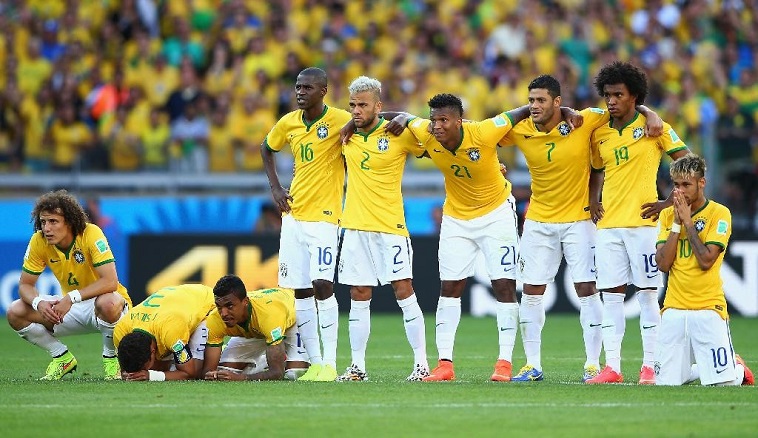It could be the most important kick of your career while thousands watch as you prepare yourself to take the penalty with the goalkeeper standing in your way. Only a penalty taker and the goalkeeper would feel the burden and the tension mounted upon them.
It is a scenario in the beautiful game which has transformed heroes into zeroes and the ordinary to instant ‘stars’. A Penalty shoot-out is perhaps the most anxious showdown for players and their fans, fostering rejoice or agony in a split second. It is a task which requires not only luck or fortune, but a combination of skill, solidity and most importantly, composure.
Origins
Before the concept of penalty shoot-outs were introduced, major tournaments in football used different ways to resolve ties. When a replay or a play-off was not possible, ties were decided by drawing lots. Israeli Yosef Dagan is credited for originating the modern shoot-out. After watching the Israeli team lose a 1968 Olympic quarter-final by drawing of lots, Michael Almog, later president of the Israel FA, described Dagan’s proposal in a letter published in FIFA News in August 1969. Later FIFA adopted the proposal in 1970.
Penalty Shoot-outs in the FIFA World Cup
Penalty shoot-outs, undoubtedly generates the highest constrain on players when it comes to football’s greatest fiesta. In World Cups, penalty shoot-outs are considered draws for both sides and would maintain their unbeaten status. Before 1978, out of the 80 knockout matches played, 76 were decided within 120 minutes while the remaining 4 were decided by replays.
Introduced in the 1978 edition, the first penalty shoot-out occurred in the 1982 World Cup semi-final between West Germany and France. It was conquered by the West Germans after a classic encounter which produced a scoreline of 3-3. During the match, the 1-1 score was transformed into 3-3 during extra time with 4 goals from both sides. Penalties went on till sudden death spot kicks, which subsequently gave a 5-4 win for the Germans.
So far 24 FIFA World Cup matches are decided by a shoot-out, the most recent being the victory by Costa Rica over Greece in the ongoing tournament.
Germany, Italy, Argentina, Brazil and France have faced most number of penalty shoot-outs in the World Cup (4). Italy carries a solitary win out of their 4 attempts. The French had suffered two losses while Brazil and Argentina have recorded 3 wins out of their 4 appearances. Germans are considered the masters in penalty taking as all four attempts (1982, 1986, 1990 and 2006) have ended in victories producing a 100% winning record. England is considered the most unfortunate team when it comes to spot kicks. They have suffered 3 losses (1990, 1998 and 2006) and are yet to win a shoot-out in the World Cup.
Shocks, Wins, Thrills and Spills on the Big Stage
The semi-final between France and West Germany was the only instance in the 1982 World Cup which was decided by spot kicks. The 1986 edition in Mexico featured 3 games which went onto penalties. The first took place between Brazil and France at Guadalajara during quarterfinals. After a 1-1 draw, the tie was resolved in a shoot-out which featured Brazilians Socrates, Julio Cesar and the acclaimed attacking midfielder from France Michel Platini missing their spot kicks. During the process, winger Bruno Bellone’s kick rebounded out off the post, hit goalkeeper Carlos Gallo’s back and subsequently bounced into the goal. Referee Loan Igna gave the goal to France, and Brazil captain Edinho was booked for protesting that the kick should have been considered a miss as soon as it rebounded off the post.
In 1987, rules were clarified that a kick is successful if, having been touched once by the kicker, it crosses the goal line without going out of play or touching any player other than the defending goalkeeper. The ball may touch the goalkeeper, posts, or crossbar any number of times before going into the net. France overcame the shoot-out 4-3. On the same day, West Germany beat Mexico 4-1 after a goalless encounter. On the following day, the quarterfinal featuring Belgium and Spain was won by Belgium 5-4 on penalties.
The 1990 tournament in Italy saw teams resorting into negative defensive tactics to “play it safe” until 120 minutes and try their luck on penalties. This resulted in 4 penalty shoot-outs, a record only to be equaled in 2006. The second round in Italia ’90 saw the Irish triumph over the Romanians 5-4 on penalties after a scoreless game. The defending champions Argentina, having lost their first choice goalkeeper Nery Pumpido due to an injury, introduced Sergio Goycochea, who proved to be an instant hero.
During their quarterfinal shoot-out against Yugoslavia, Goycochea blocked two penalties where the showdown ended 3-2 in Argentina’s favour. However despite their win, Maradona’s penalty miss created a brief shock in their camp. In the semi-finals, Argentina met hosts Italy in Napoli. After a 1-1 deadlock prevailing for 120 minutes, the match went into penalties. This time, Maradona converted his spot kick while Goycochea again came into the spotlight as he blocked penalties by Aldo Serena and Roberto Donadoni bringing a 4-3 win to the Argentines. Along with the victory, Argentina achieved a rare feat obtaining consecutive wins off penalty shoot-outs in the World Cup. In the other semifinal, West Germany beat England 4-3 in their third shoot-out in three World Cups to meet Argentina in the finals.
Sergio Goycochea, the Argentine hero from 1990, still holds the record for most saves in a tournament while sharing the record for the most career saves in the World Cup along with Harald Schumacher of West Germany (4).
The 1994 World Cup staged in USA saw 3 penalty shoot-outs including the first final to be decided by spot kicks. Bulgaria beat Mexico 3-1 on penalties in their second round fixture following a 1-1 draw. Surprise package Romania faced Sweden in the quarterfinals, which proved to be memorable encounter. After scores being 1-1 at 90 minutes, the game went into extra time. Romanian striker Florin Raducioiu scored his second goal at extra time but soon was foiled when Kennet Andersson equalized five minutes from time. The 2-2 scoreline was set to be settled by a shoot-out. After penalties were leveled at 4-4 following the five regular spot kicks, the game went into a sudden death while Miodrag Belodedici missed his kick giving the Swedes a 5-4 win. The 1994 final between Brazil and Italy became the first ever final to be decided by penalties. During the shoot-out, Italians Franco Baresi and Daniele Massaro missed their spot kicks while Marcio Santos failed to convert his penalty for the Brazilians. The deciding moment came when reigning Player of the Year, Roberto Baggio stepped up to take his spot kick to keep Italy alive in the competition. Having not been fully recovered from his hamstring injury, Baggio lifted the ball over the cross-bar to the sunny California sky, giving Brazilians the victory. The Italian legend still is largely remembered for his penalty miss in 1994 despite his successful career.
When France hosted the ultimate show in 1998, penalty shoot-outs decided three games. The first happened in the round of 16 between Argentina and England at Saint-Etienne. After a 2-2 deadlock, the confrontation was to be decided on penalties. England took the early advantage when David Seaman blocked Hernan Crespo’s spot kick. But Carlos Roa came on to become the hero as he blocked penalties of Paul Ince and David Batty, giving the Argentines a 4-3 win. Roa, affectionately known as “lettuce” due to his strictly vegetarian diet, replicated his predecessor Goycochea, taking Argentina to the next round.
Italy was yet again beaten on penalties, this time at the hands of eventual champions France in the quarterfinals. Penalties ended 4-3 in France’s favour following a scoreless encounter. During the semi finals, it required penalties to solve the tie between two strong teams, Brazil and Netherlands. Although both teams rightly deserved a place in the finals, the shoot-out went in Brazil’s favour. The game ended 1-1 following goals by Ronaldo and Patrick Kluivert. During spot kicks, Ronaldo and Rivaldo tasted success while Dutch skipper Frank de Boer and Dennis Bergkamp held the balance. Emerson’s kick brought a possible advantage to the Brazilians when Cocu missed his penalty. After Dunga sealed the advantage with the fourth kick, Frank’s twin brother Ronald de Boer was given the responsibility to keep the Dutch going in the tournament but he was undone by goalkeeper Taffarel, opening the gates for the Brazilians to the grand finale.
In 2002, Spain was involved in two shoot-outs. Against Ireland, they won 3-2 on penalties but later lost to South Korea 5-3 in the quarterfinals.
During the 2006 World Cup, four games were decided through this method, equaling the record with Italia ‘90. Switzerland qualified for the round of 16 without conceding a single goal. They were confronted by Ukraine as the 0-0 result left both teams facing the lottery of penalties. Ukraine secured a 3-0 win leaving Switzerland to become the first country not to score a single penalty in a World Cup shoot-out. Hosts Germany maintained their 100% winning record in shoot-outs when they knocked Argentina out of the tournament during quarterfinal. Jens Lehmann saved Roberto Ayala and Esteban Cambiasso’s penalties which resulted a 4-2 win for the Germans. Having lost in 1990 and 1998, England faced Portugal in the quarterfinals. But yet again they were defeated at the harsh facet of spot kicks, this time leaving Portuguese goalkeeper Ricardo to create a new record by blocking three penalties in a single shoot-out. Frank Lampard, Steven Gerrard and Jamie Carragher all failed to find the back of the net with Ricardo Pereira.
The 2006 finals in Berlin became only the second ever to be decided by penalties. Italians, who came into the penalty spot with 3 previous defeats (1990 semi- final, 1994 final and 1998 quarter-final) finally emerged as winners, converting all 5 spot kicks, earning a much awaited fourth World Cup title.
In South Africa 2010, Paraguay beat Japan 5-3 following a 0-0 draw. In the quarterfinals, the only remaining African team Ghana was beaten by Uruguay 4-2 in possibly the most dramatic game in the tournament. The 1-1 deadlock was to be broken in the last minute of extra time when Ghana was awarded a penalty following a deliberate handball by Luis Suarez. But Asamoah Gyan missed the crucial spot kick, paving the way to a shoot-out which Uruguay eventually tasted victory.
Is there a right way to approach to a penalty shoot-out? Would penalty taking sessions during training, help players and goalkeepers to absorb the weight when it comes to a shoot-out in a packed stadium? Or is it sheer luck? The answers remain debated while new alternatives such as ADG (Attacker Defender Goalkeeper) are being introduced. However one thing about taking a spot kick is certain, that it’s a mix bag of fortune, adroitness, steadiness and composure.















